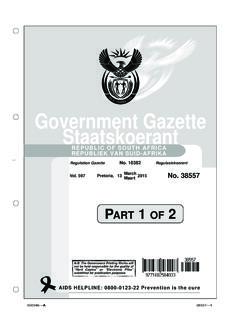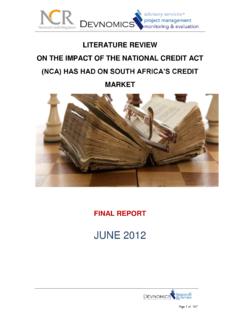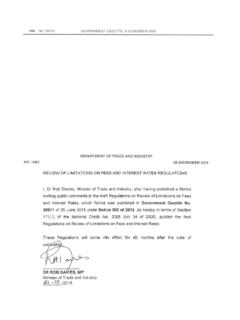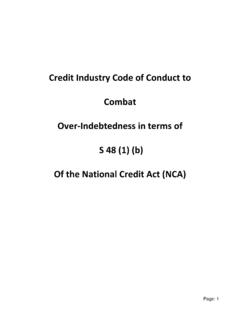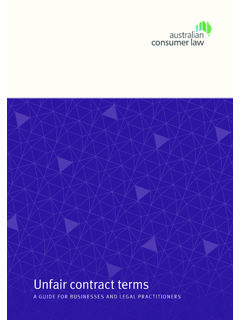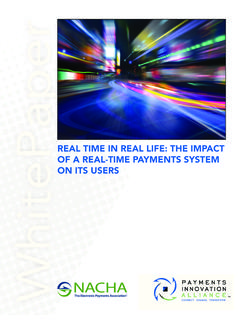Transcription of THE NATIONAL CREDIT ACT, 2005 - is
1 THE NATIONAL CREDIT ACT, 2005'All you need to know about the NATIONAL CREDIT Act as a consumer 'Volume 1: 2007 All you need to know about the CREDIT Act as a consumer1 ForewordThis booklet serves as a guide to the NATIONAL CREDIT Act 34/2005 (NCA) also referred to as 'The Act'. It is for persons who take up CREDIT in the form of a loan, lease, instalment sale, CREDIT card or obtaining goods or services on CREDIT , etc from a CREDIT provider. It is also for the use of persons or organizations acting as consumer CREDIT intermediaries such as advice centres, trade union officials and provincial consumer directories. It is an attempt to simplify the provisions of The Act as they pertain to the consumer . This booklet is not legally binding. Should there be any doubt about the meaning or application of any of the provisions of The Act, the relevant sections of the legislation as well as the regulations should be using the booklet, please note that at the end of each chapter there is a glossary simplifying terms for the benefit of the consumer who may have limited knowledge of CREDIT terms.
2 Where possible, the relevant sections of The Act have also been indicated should the reader need further clarification on the topic to the NATIONAL CREDIT Act3 consumer CREDIT rights9 CREDIT agreements15 Marketing practices25 Costs28 Termination, surrender and early settlement ofcredit agreements35 Defaulting and debt enforcement40 Debt counselling44 CREDIT bureaux and CREDIT information51 Disputes and complaints61 Enforcement of the NATIONAL CREDIT Act66 Other useful contacts70213456789101112 Chapter 1 Background to the NationalCredit ActThe aim of this chapter is to give the consumer a general overview of The ACT, by answering the following questionsabout The Act:- Why was the Act introduced? What is the purpose of the Act? Which CREDIT providers does the Act regulate? Which CREDIT agreements does the Act regulate?The NATIONAL CREDIT Act was introduced to: Promote the economic and social welfare of all South Africans Promote a fair and transparent CREDIT market Protect consumers and their rights in the CREDIT market Regulate all CREDIT providers, Debt Counsellors and CREDIT bureaux Limit the cost of CREDIT Level the playing fields between CREDIT providers by standardizing the way in which CREDIT is granted by CREDIT providers, so that consumers can compare what is being you need to know about the CREDIT Act as a consumerThe purpose of the NATIONAL CREDIT Act is to: Simplify and standardize the manner in which information is disclosed in CREDIT agreements.
3 The Act specifies the manner in which CREDIT providers have to provide information on CREDIT agreements. The Act also requires that CREDIT providers provide this information in simple language that the consumer can understand. The reason for this is that consumers should be able to read and understand the information so that they can compare the information on CREDIT agreements from different CREDIT providers in order to make informed choices. Regulate CREDIT burueax and the information they keep on record about consumers. Act stipulates the type of information that CREDIT burueax can keep on consumers, how the information is obtained, used, and for how long that information may be kept on their records. More importantly, The Act aims to ensure that CREDIT bureaux keep accurate records on consumers. Ensure that all CREDIT products are handled in the same way by different CREDIT providers.
4 A CREDIT product refers to the manner in which a CREDIT provider gives CREDIT to a consumer . Examples of CREDIT products include overdrafts, CREDIT cards, personal loans, clothing or furniture accounts. The aim is to ensure that the consumer knows that all CREDIT providers will treat the same products in the same way. 4 Assist over-indebted consumers to restructure their debt. The Act provides for consumers, who are unable to service their monthly repayments on their CREDIT agreements, to be assisted by Debt Counsellors to rearrange their monthly repayments with their CREDIT providers. The Act also aims to prevent over-indebtedness of consumers and to encourage responsiblelending by CREDIT providers. Have one regulator to regulate the entire CREDIT market - the NATIONAL CREDIT Regulator (NCR). The Act establishes the NCR, which is responsible for ensuring compliance with The Act.
5 CREDIT providers are required to register with this body in order for them to operate legally. Consumers can lodge complaints regarding CREDIT providers and CREDIT bureaux with the NCR if they have been unable to resolve their disputes directly with the creditprovider or the CREDIT bureaux. Establishing the NATIONAL consumer Tribunal to adjudicate matters relating to The Act. The Act further creates the NATIONAL consumer Tribunal which is an independent consumer court tasked with hearing cases and making orders relating to consumer complaints and disputes with CREDIT providers, contraventions of The Act and decisions of the NATIONAL CREDIT Act regulates the following CREDIT providers: Banks Micro lenders Retailers such as clothing and furniture stores All businesses, companies, close corporations and individuals who do business on CREDIT , provide loans, or charge interest on overdue accounts.
6 In addition, it regulates CREDIT bureaux and Debt Act regulates the following CREDIT agreements: Mortgage bonds CREDIT facilities like store cards, bank overdrafts, CREDIT cards, garage cards, personal loans, instalment sales, leases, pawn and discount transactions. Developmental CREDIT Incidental CREDIT CREDIT guarantees. 6 CREDIT provider - a party who lends money or provides CREDIT to another under a CREDIT agreement. Debt Counsellors individuals registered with the NCR, who assist over-indebted consumers to restructure their debt, either by way of negotiating with the CREDIT providers including obtaining a court order on behalf of consumers. CREDIT bureaux - entities that: retain and disclose for payment, personal ( CREDIT ) information and receive reports or investigate CREDIT applications, CREDIT agreements, payment history or patterns; compile and maintain data from reports containing the above; issue reports based on the abovementioned agreement - an agreement in terms of which a CREDIT provider sells goods or lends money to a consumer .
7 The consumer is expected to agree to the terms and sign the agreement. The agreement will contain information about the CREDIT product that the consumer has applied for and been granted. This information should include questions such as the repayment period, insurance, interest and other fees charged and what will happen if the consumer fails to pay his/her you need to know about the CREDIT Act as a consumerDevelopmental CREDIT - a special type of CREDIT that is created and defined in the NATIONAL CREDIT Act. In terms of The Act, there are three types of developmental CREDIT loans for educational purposes, loans to build, expand or improve low-cost housing and loans to set up small- and medium-sized CREDIT When the original agreement for the sale of goods and services is entered into, between any supplier and consumer the intention is not to extend CREDIT to the consumer .
8 In other words it is not a CREDIT agreement, but due to the consumers failure to pay for the goods or services on or before a determined date, a fee, charge or interest is added to the amount due. The agreement is now referred to as an incidental CREDIT agreement. An example of incidental CREDIT would be an overdue municipal account or an overdue doctor's account. (Sections 5, 8, 10, 12, and 26)OTHER RELATED TOPICS: consumer rights (chapter 2) CREDIT agreements (chapter 3 CREDIT burueax (chapter 9)Disputes and complaints (chapter 10)Enforcement of the ACT (chapter 11)Glossary89 Chapter 2 consumer CREDIT rightsThe NATIONAL CREDIT Act guarantees consumers the following rights, which will be covered in this chapter: The right to apply for CREDIT The right not to be discriminated against when applying for CREDIT The right to be given reasons for CREDIT being declined The right to be given documents in an official language that the consumer understands The right to be given documents in a clearly understandable language The right to be given written documentation relating to the CREDIT transaction The right to confidentiality of personal information The right to access and challenge information held by a CREDIT bureau The right to receive periodic you need to know about the CREDIT Act as a consumerThe right to apply for creditThe NATIONAL CREDIT Act provides every person, whether an individual, a group of people or a company, has the right to apply for CREDIT from any CREDIT provider.)
9 This right, however, does not prevent the CREDIT provider from refusing to grant the CREDIT , provided the reason for refusing to grant the CREDIT is based on business grounds that are in line with their normal CREDIT risk evaluation processes. (Section 60)The right not to be discriminated against when applying for creditConsumers who are applying for CREDIT are further protected against unfair discrimination by a CREDIT provider. The Act forbids CREDIT providers from discriminating against consumers on the basis of colour, race, age, political affiliation, sexual orientation, religious belief, or affiliation to any particular trade union. A consumer who is of the opinion that he/she has been discriminated against for these reasons may act against the CREDIT provider through the Equality Court, or may complain to the NATIONAL CREDIT Regulator which will refer the matter to the Equality Court.
10 (Section 61)The right to be given reasons for CREDIT being declinedThe NATIONAL CREDIT Act gives a consumer , whose CREDIT application has been declined by a CREDIT provider, the right to request written reasons explaining why his/her application for CREDIT has been declined. If the decision to decline the consumer 's request is based on an unfavourable report received from a CREDIT bureau, the Act stipulates that the CREDIT provider must supply the consumer in writing with the name, address and other contact details of the CREDIT bureau from which the CREDIT provider received the information. (Section 62)1011 The right to be given documents in an official language that the consumer understandsA consumer has the right to receive documents from a CREDIT provider in an official language that he/she understands.
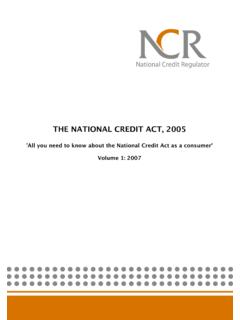


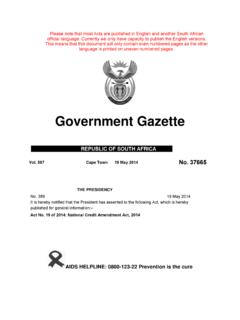
![National Credit Act [No. 34 of 2005] - ncr.org.za](/cache/preview/e/1/4/f/9/e/9/9/thumb-e14f9e9994b5110ac0b591f97627b092.jpg)

